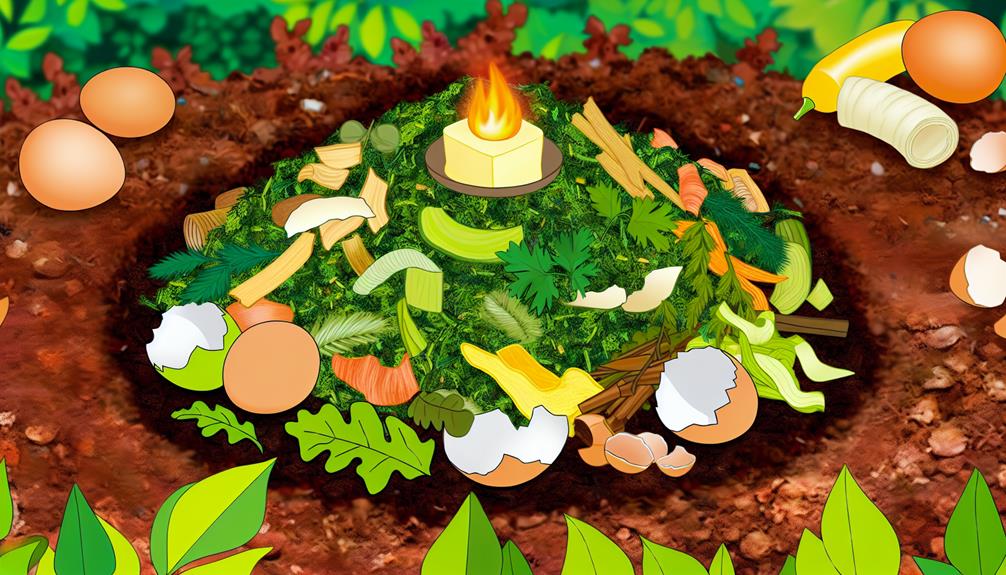

You can compost butter, but it’s quite tricky due to its high fat content. Butter decomposes slowly and can attract pests if not handled properly. To avoid these issues, bury it deep within your compost pile and use a closed bin. Balance the fat by mixing in carbon-rich materials, like leaves and straw, and turn the pile regularly to keep it aerated.
Although it helps reduce landfill waste and can enrich soil, it’s usually simpler to compost plant-based oils instead. Keep an eye on managing strong odors and pest attraction for better results. Dive deeper to uncover more about effective composting!
Butter’s composting challenges stem primarily from its high fat content, which can disrupt the balance of your compost pile. When you add butter, the fats don’t break down as quickly as other organic materials. This slow decomposition can attract pests like rodents and insects to your compost, making the process less efficient.
Additionally, the fats can create a sticky, smelly mess, which isn’t ideal for maintaining a healthy compost environment.
To successfully compost butter, you need to balance it with high-carbon materials like leaves or cardboard. This helps absorb the fats and speeds up decomposition. Mixing butter with smaller amounts and turning your pile regularly also improves results.
Also Read: Can You Compost Artichoke?
Balancing butter’s composting challenges not only helps maintain your compost pile but also reduces its environmental footprint. When you compost butter properly, you’re diverting waste from landfills, which decreases methane emissions—a significant greenhouse gas. Methane’s environmental impact is substantial, so your efforts in composting can make a real difference.
Additionally, composting butter enriches your soil with nutrients, creating a more sustainable gardening cycle. This means you’re not only reducing waste but also supporting healthier plant growth without relying on chemical fertilizers. By taking these small steps, you’re contributing to a larger community effort to protect our planet.
Your actions show others that even minor changes, like composting butter, play an essential role in environmental conservation.
One challenge you might face when composting butter is that it can attract pests such as rodents and insects. These critters are drawn to the fat and oils in butter, which can disrupt your composting efforts.

To help you manage this, consider these four tips:
Managing the fat content in your compost is key to ensuring a healthy and efficient decomposition process. High fat levels, like those from butter, can create anaerobic conditions, slowing down the composting and producing unpleasant odors.
To keep your compost community thriving, balance fats with plenty of carbon-rich materials such as leaves, straw, and cardboard. Mixing in these ‘browns’ helps soak up excess fat, maintaining aeration and preventing clumping.
Regularly turning your compost pile will also help distribute fats more evenly, promoting quicker breakdown. Remember, the goal is to create a harmonious environment where microorganisms can work their magic, turning waste into rich, nourishing soil.
Together, we can transform our scraps into something valuable!
Also Read: Can You Compost Apple?
Consider using plant-based oils, which decompose more readily and don’t create the same anaerobic conditions as butter. These alternatives can be more compost-friendly and integrate well into your green practices.

Here are some options you might explore:
These choices help maintain a healthier compost pile.
Also Read: Can You Compost Basil?
To achieve best results, focus on maintaining a balanced mix of green and brown materials in your compost pile.
Green materials, like fruit scraps and coffee grounds, provide nitrogen, while brown materials, such as dry leaves and cardboard, supply carbon.
Aim for a ratio of about three parts brown to one part green.
Turn your compost regularly to guarantee proper aeration, which speeds up decomposition and reduces odors.
Keep the pile moist, like a damp sponge, but not soggy.
Avoid adding meat, dairy, or large amounts of butter, as they can attract pests and slow down the composting process.
Composting butter can be tricky due to its fat content, which attracts pests and slows decomposition. Instead, consider alternatives like vegetable scraps or coffee grounds for a healthier compost pile.
By managing what you compost and following effective tips, you’ll create rich, nutrient-dense soil. Remember, the key to successful composting lies in balance and variety.
Embrace these practices, and you’ll contribute positively to the environment while enhancing your garden’s health. Happy composting!
